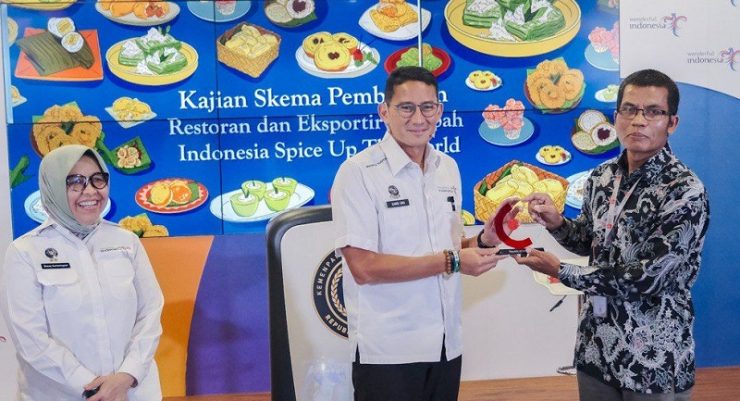THE MINISTRY of Tourism and Creative Economy is collaborating with the National Research and Innovation Agency (BRIN) to conduct a study of appropriate financing schemes for participants of the Indonesia Spice up The World (ISUTW) program.
Indonesia Spice Up the World (ISUTW) is the Ministry of Tourism and Creative Economy’s flagship program which aims to promote Indonesian culinary delights. Apart from also increasing the number of spice exports from Indonesia throughout the world with a target export value of US$2 billion. In an effort to achieve this target, it is necessary to study the financing scheme and what participants need based on data and evidence in the field.
According to the Minister of Tourism and Creative Economy, Sandiaga Uno recently said that therefore, the Deputy for Strategic Policy at the Ministry of Tourism and Creative Economy is collaborating with BRIN to study and determine the appropriate financing scheme to be implemented in this program. There are several activations, but we need to base the ISUTW program so that it is based on data and evidence.
“Based on the data that has been obtained, the largest distribution of Indonesian restaurants is in the Netherlands, with 295 restaurants. Apart from the Netherlands, there are 162 Indonesian restaurants in Australia, 89 restaurants in the United States, 70 restaurants in Malaysia and 66 restaurants in Japan,” he said.
Sandiaga explained, based on the study we conducted with BRIN, that restaurant businesses abroad each have a unique typology, namely that the restaurant owner also plays the role of restaurant manager. Then the business takes the form of the restaurant itself, there are pop-ups, all you can eat, food courts and cloud kitchens.
“Another fact discovered by her team in the field, namely that restaurant managers had quite difficulty getting authentic Indonesian spices in their respective countries. So, they are forced to import the spices themselves from Indonesia and buy them from local shops, which are often expensive and rare,” he remarked.
Meanwhile, Deputy for Strategic Policy at the Ministry of Tourism and Creative Economy, Dessy Ruhati, added that using Indonesian spices will definitely preserve the Indonesian taste. This is an opportunity for the ISUTW program to increase spice exports to countries that have a large number of restaurants.
Regarding the financing scheme, Dessy explained that 43% of Indonesian restaurants abroad have an average turnover of under IDR300 million per year. As many as 29%, the turnover was IDR300 million-IDR2.5 billion, 19% had a turnover of IDR2.5 billion-IDR50 billion, and 9% had a turnover of more than IDR50 billion. Restaurant entrepreneurs need financing that varies depending on the scale of their business, ranging from IDR500 million to IDR5 billion, which will later be used to open new restaurants and expand existing ones.
“The financing tenor desired by each restaurant owner who is also a restaurant manager also varies, but most want a tenor of one to five years with interest of one to three percent,” he said.
Therefore, said Dessy, his party will coordinate with the Deputy for Marketing at the Ministry of Tourism and Creative Economy and the Deputy for Industry and Investment at the Ministry of Tourism and Creative Economy to develop the market for original Indonesian herbal products throughout the world, especially in Europe.
“This is also in the context of developing the Indonesian restaurant industry abroad. “This synergy is also expected to be able to provide the most appropriate form of financing scheme for restaurant development, which we hope will reach 4,000 Indonesian restaurants throughout the world by 2024,” Dessy noted.
Likewise, the Head of the Center for Macroeconomics and Finance at BRIN, Zamroni Salim, said that from the results of the studies that had been carried out, it was necessary to create a kind of spice hub abroad, either initiated by BUMN or handed over to the private sector, and further studies were needed regarding the creation of this hub.
“Apart from that, what is no less important is the Special Export Assignment (PKE) which is really needed by Indonesian spice exporters and distributors to be able to go abroad. PKE is the right scheme to facilitate and expand Indonesian spice exports throughout the world. PKE through LPEI (Indonesian export financing institution) is really needed by the business world, especially exporters, spice distributors, including restaurants in the world,” concluded Zamroni. [traveltext.id]
















